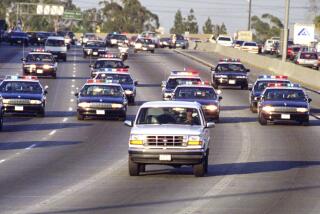O.J. Jury Literary Trivia
- Share via
From family drama to glove fashions, the O.J. Simpson trial caters to every taste. So I suppose it’s not surprising that even a football-phobic book-lover like myself can find the occasional nugget of literary interest in all the trivia surrounding the main event.
One recent book-related snippet concerns Superior Court Judge Lance A. Ito and the jury. Having dealt sharply with jurors allegedly writing books, Ito was further alarmed by the potentially damaging influence of one juror’s reading material, a bestseller by that famous lawyer, John Grisham. After taking the book home and reading it overnight (does the poor fellow ever sleep?), the judge pronounced it innocuous.
Of course anyone in the business of banning books will tell you that even the most innocent-seeming text can be a hazardous reading experience. Hence the censors’ unceasing attempts to keep school children form reading classics like “The Adventures of Huckleberry Finn” and “Catcher in the Rye” for their portrayals of racism and adolescence.
Let’s face it, good literature, with its challenge to accepted thinking, is by its very nature dangerous. No juror could be considered impartial after reading, say, the New Testament, with its revolutionary ideas about forgiveness and redemption; Dostoyevsky’s “Crime and Punishment,” which suggests that guilt over committing a crime is punishment enough; or Franz Kafka’s “The Trial,” about a man who is arrested without having done anything wrong and is then subjected to a series of nightmarish and incomprehensible legal procedures.
Since O.J. jurors seem to get a lot of practice listening, Nick Stearn, the owner of Sound Audio Books in Agoura Hills, recently donated 25 audio books to the jury, who, he says, “flipped for ‘em.” Some may say that a pair of headphones is nothing like curling up with a good book. But does it matter? Whichever sense you use to absorb literature--and the blind must feel their books--the story goes to the same place, your imagination. There it becomes wholly yours, to ponder at your leisure. Stearn’s donations to the jury included titles by Michael Crichton, Tom Clancy, Dean Koontz and Mary Higgins Clark, “mostly mystery and suspense, the hit books that people like to listen to.”
If I were donating, the list would look a little different. Here’s my choice of titles for every stage of the trial:
Opening Statements: “Briefing for a Descent into Hell” by Doris Lessing.
Listening to the Evidence: “The Path to the Nest of Spiders” by Italo Calvino.
The Jurors’ Sense of Isolation: “The Labyrinth of Solitude” by Octavio Paz (or, for alternates, “One Hundred Years of Solitude” by Gabriel Garcia Marquez).
Tensions Rise: “People in Trouble” by Sarah Schulman.
Tempers Boil: “I’m Dysfunctional, You’re Dysfunctional” by Wendy Kaminer.
The Jury Begins Deliberations: “An Atlas of the Difficult World” by Adrienne Rich.
The Jury Hangs in There: “The Trick is to Keep Breathing” by Janice Galloway.
More to Read
Sign up for our Book Club newsletter
Get the latest news, events and more from the Los Angeles Times Book Club, and help us get L.A. reading and talking.
You may occasionally receive promotional content from the Los Angeles Times.







